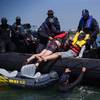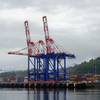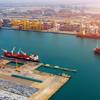WA Oil Transfer Rules Protect Waters
In September 2006, state lawmakers directed Washington Department of Ecology (Ecology) to adopt stringent oil transfer rules after 4,700 gallons of heavy fuel oil spilled during an oil transfer operation at Chevron-Texaco's Richmond Beach fuel terminal in December 2003. Swift currents drove the oil ashore on the Suquamish Tribe shellfish beds at Doe-kag-wats beach and salt marsh at Indianola in Kitsap County.
In 2008, nearly 15 billion gallons of oil were transferred over Washington waters by ship, fueling facility, tank truck or rail, according to Ecology reports. That equals 1.7 million gallons an hour.
Since the rules went into effect, Ecology has seen reductions in the amount of oil spilled. In 2008, only about 158 gallons were spilled to Washington waters during fuel transfers.
“Puget Sound is an ecosystem in trouble and no spills are acceptable,” said Spills Program Manager Dale Jensen. “The Legislature acknowledged this by setting a ‘zero spills' goal for the state.”
Jensen said the economic and environmental consequence of a major oil spill today is potentially greater than ever given the designation of several species as threatened and endangered, the cultural value of tribal lands and private property values, and our economy's heavy reliance on Pacific Rim trade, recreation, sport and commercial fishing, aquaculture and tourism.
State regulations require up to 24-hour advance notice whenever bulk oil transfers of more than 100 gallons occur over state waters from certain types of facilities such as refineries, refueling terminals, railcars, tank trucks and all vessels delivering oil.
Last year Ecology received 15,111 advance notices of fuel transfer reports, about twice as many as originally anticipated when the rules went into effect.
The rules apply to:
• Oil tankers and fuel barges
• Fishing, cargo, passenger ships, and other non-recreational vessels
• Oil storage facilities and refineries
• Marinas fueling non-recreational vessels
• All mobile fuel transfers from tank trucks and railcars
The rules do not apply to fuel being transferred internally from one tank to another such as the recent spill that occurred on the Catherine Quigg near Eagle Harbor in King County on Feb. 3, 2009.
In October 2007, the regulations required all vessels delivering oil and the state's 23 major land-based, large-volume oil handling facilities to deploy containment boom equipment before starting oil transfers over water at rates of 500 gallons per minute or more.
The pre-booming requirements cover petroleum and plant-based fuel products such as crude oil, diesel and bio-diesel fuel, and heavy fuel oils.
The agency determined that high-rate fuel transfers over water presents the highest risk of a sizeable oil spill. The rules gave high-rate deliverers a year to craft plans showing how they would comply with the new measure.
Pre-booming has been shown to be highly effective at trapping and containing spilled oil which:
• Reduces adverse environmental impacts;
• Reduces response time and cleanup costs;
• Greatly improves the chance of oil recovery; and
• Reduces economic impacts on the communities where a spill occurs.
By the end of 2008, almost 80 percent of all high-rate transfers required to be pre-boomed were pre-boomed.
“This is an excellent overall compliance rate considering the great variability in weather and currents that often make pre-booming difficult or unsafe,” said Spill Prevention Manager Chip Boothe. “The fact that we are seeing nearly 90 percent of the fueling operations that are required to be pre-boomed in Puget Sound being pre-boomed is more great news for the state's efforts to better protect Puget Sound.”
To support the new rules Ecology expanded its oil transfer inspection program and stationed five new inspectors at its Bellingham, Bellevue and Vancouver field offices. The agency inspectors provide technical assistance and help companies comply with the rules. Last year, inspectors conducted 1,491 oil transfer inspections.
“We are committed to preventing spills from happening in the first place because it is key to preserving our waters,” said Boothe. He said the department screens vessels entering Washington waters for potential risks that may lead to a spill.
“In 2008, our inspectors boarded 1,110 vessels and performed 2,546 vessel and facility inspections. In addition, they held 539 notification drills.” Boothe said. “I am proud that we continue to test industries' ability to make the proper calls to state and federal authorities if they have a spill – and keep any environmental impacts to a minimum.”












